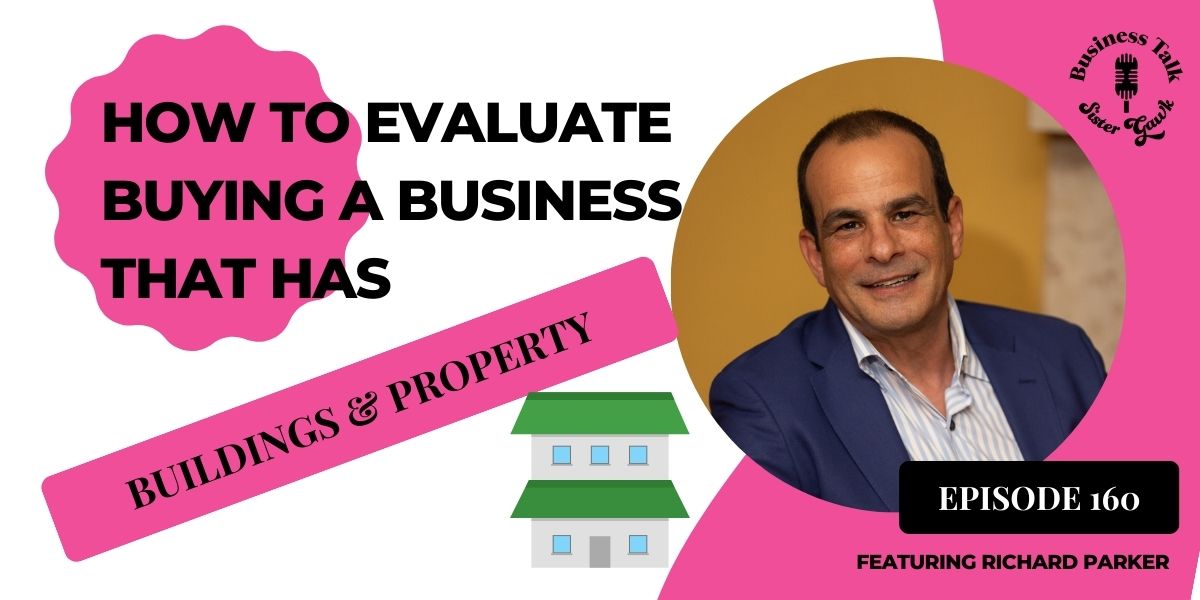Richard Parker has bought 13 different businesses personally and has spent 34 years working with acquisitions and mergers. In this episode, he discusses how to separate the value of a business from the value of real estate. Richard covers how you should consider how the actual property rental costs, noting that many business owners paying themselves rent for the use of the property space the business occupies or won’t pay themselves any rent at all. These two distinct differences are big items to consider when projecting what you will need to factor into your own costs of running the business once you acquire it. This tip, and so many more are in this episode. Take a listen!
Mastering Business Acquisitions: A Deep Dive into Evaluating Properties and Buildings
Welcome to Business Talk Sister Gawk, where insightful conversations unfold. I’m Bekkah, your host, and in today’s episode, we’re delving into the intricacies of evaluating businesses with a focus on properties and buildings. Joining me is Richard Parker, a seasoned expert in Mergers and Acquisitions with over 34 years of experience. Let’s unravel the wisdom he brings to the table.
1. What Drives Richard Parker in the World of M&A?
For our listeners who may not be familiar, can you share what M&A stands for, and what inspired you to immerse yourself in this field?
Richard Parker: M&A stands for Mergers and Acquisitions, essentially the art of buying and selling businesses. I’ve been involved in this for 34 years, both as a business buyer and seller, a sell-side representative, and working for the Dalio family office. The driving force behind my journey began with a financial setback, losing $60,000 in the stock market. Faced with this challenge, I realized the limitations of traditional employment and ventured into business ownership, sparking my journey into M&A.
2. Navigating the Path of Entrepreneurship: Richard’s Origin Story
Your story of transitioning from a high-paying job to starting your own business is intriguing. Could you share more about your decision-making process during that pivotal moment?
Richard Parker: Certainly. In my late twenties, I found myself in a financially challenging situation after a stock market loss. With a family on the way, I recognized the need for a solution beyond conventional employment. Entrepreneurship became the answer, and I embarked on acquiring my first business, setting the stage for a journey that has since encompassed 13 businesses and extensive experience in the M&A landscape.
3. Unveiling the Nuances of Property Ownership in Business Transactions
When it comes to businesses with properties, ensuring the rightful ownership can be a challenge. How do you navigate this issue during due diligence, especially when the property might be owned by someone other than the business itself?
Richard Parker: It’s a critical aspect that requires meticulous attention. To ascertain property ownership, thorough title and lien searches are essential. Working with competent attorneys well-versed in real estate nuances is crucial. It’s not uncommon for property ownership to be linked to individuals associated with the business, like the owner or family members. Diligence in this area is vital to avoid complications.
4. Separating Business and Property Valuation: A Pragmatic Approach
Valuating a business with properties can be complex. How do you approach this task, particularly when distinguishing the value of the business itself from the value of its real estate?
Richard Parker: It’s crucial to separate the valuation of the business and the property. While the business valuation involves various components, the property valuation should be handled by a professional real estate appraiser. Both entities require independent evaluations to ensure a comprehensive understanding of their worth. Co-mingling these valuations can lead to inaccurate assessments, especially when dealing with businesses that might not be profitable.
5. Assessing the Market and Property: A Strategic Overview
When considering a business acquisition with property, how do you conduct a market analysis? Is collaboration with a business realtor necessary, or are there specific strategies you employ?
Richard Parker: The key is to segregate the business and property for valuation purposes. For the business, understanding its financials and potential for income generation is paramount. Property, on the other hand, should be appraised by a real estate professional. Coordinating efforts between business and real estate experts ensures a comprehensive market analysis, aiding in strategic decision-making.
6. Structuring Businesses for Financial Success
Can you explain the concept of a business paying rent to itself, especially when assets are held in a different company?
Richard Parker (RP): Absolutely. When a business pays rent to itself, it often involves segregating assets, with property being a prime example. It’s crucial to keep property in a separate entity to avoid its potential decline if the business faces challenges. This separation also facilitates strategic decisions, such as selling the property independently of the business.
7. Managing Assets: A Deeper Look
How should other assets, like machinery and equipment, be considered in the acquisition process, especially regarding depreciation and valuation?
RP: Evaluating assets can be complex, especially with depreciation in play. In simpler terms, the purchase price of a business includes a valuation based on its profit, with a multiple applied. Even if prior owners fully depreciated assets, the new owner, through an asset sale, can reset their value for tax benefits.
How do you factor in the depreciation when determining the business’s overall value, considering the potential need to replace equipment in the future?
RP: The buyer needs to offset added depreciation with a realistic assessment of the future costs of replacing equipment. While the balance sheet may show zero value for fully depreciated assets, their functional worth is still present and can be factored into the new valuation.
8. Beyond the Numbers: Assessing Business Maintenance
Considering your belief that once a seller decides to sell, their focus shifts, how crucial is it to assess overall business maintenance, including property and equipment?
RP: It’s imperative to look beyond visible assets and financials. The value of a business extends to its industry standing, competition, employees, systems, contracts, customer and supplier relationships, and legal aspects. Past performance matters, but the focus should be on the business’s future under new ownership.
How should a potential buyer navigate through the emotional aspects and varied agendas involved in a business acquisition?
RP: Buyers need a blend of logic and emotion. While logic ensures the right processes are followed, emotion prompts diligence. Understand that most stakeholders, except those on your team, prioritize selling the business. The asking price doesn’t equal the purchase price, making it crucial for buyers to determine the true value based on their goals.
9. Where to find more valuable insights and resources to master the art and science of business acquisitions?
RP: Interested individuals can explore my website, RichardParker.com, which hosts numerous free articles and reports on buying businesses. Additionally, my comprehensive course, inspired by real-world experiences and failures, is available for those seeking a deeper understanding. You can also find me on Instagram: @richarparkerdiomo and Facebook: @RicharParkerDiomo
In conclusion, mastering the acquisition process requires a meticulous blend of financial acumen, industry insight, and a keen understanding of the emotional dynamics at play. For more in-depth knowledge and personalized guidance, Richard Parker’s resources provide an invaluable roadmap for aspiring business buyers.
If you’re navigating the complexities of buying a business with real estate, this podcast offers practical advice and expert guidance.
This episode is part of ¨The Building Series¨. Don’t miss the chance to get a lot more insightful information if you are navigating the complexities of business and buildings.
What to Look for When Buying a Multifamily Property
What is a Good Location for a Business
Note: This blog post is based on a podcast interview conducted by Bekkah from BTSG and features insights from Richard Parker. All content is derived from the conversation, and any interpretations are made with the intent of providing a comprehensive overview.




